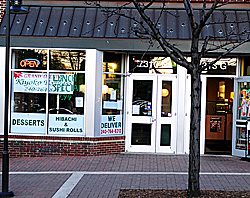
Kiyoko Express, a Japanese restaurant, opened on Route 1 three weeks ago. On the entrance to the restaurant hangs a whimsical warning.
“If you don’t eat, we both starve,” the sign reads.
While they may be joking, management of the two previous restaurants can attest to the truth behind the statement. There is no better example of the seemingly never-ending revolving door of restaurants in College Park than Terrapin Station, a strip of stores along Route 1, and the home of Kiyoko Express, as well as a new pizzeria and a Peruvian chicken eatery. Over the past four years, three different restaurants will have occupied both the 7313-H and 7313-A addresses in Terrapin Station. All four of the previous restaurants failed shortly after opening.
Kiyoko Express will replace Fractured Prune, a donut shop that opened in October 2007. Fat Tino’s Pizzeria will replace Eats, an Americana restaurant that opened around the same time. Eats and Fractured Prune had replaced Roly Poly Sandwich Shop and Samurai Sam’s Teriyaki Grill. Both were closed by this summer. Chicken Rico will open in a long-vacant storefront between the two.
The reasons that city officials, business owners and others give for the constant turnover in dining options are numerous: strong competition, high rents, lack of foot traffic and inexperienced management.
“We have so many [restaurants],” said Chris Warren, College Park’s economic director. “If you’re not able to deal with the competition, it’s quite fierce. People don’t realize that the rents are very high.”
Warren said it’s not uncommon for businesses to fail within the first three years of existence and the situation in College Park isn’t unique. He also tries to help new restaurant owners get a feel for what they’re getting into and tells them to negotiate rent with landlords. Rents, he said, can range from as low as $20.50 and to as high as $45 per square foot.
But Richard Greenberg of Greenhill Capital Corporation said it’s not the rents that make businesses fail but cites inexperience as the key impetus for failure. Greenhill Capital Corporation, which owns Terrapin Station, leases out the buildings to tenants.”I think it’s been a lack of operations,” Greenberg said. “I don’t believe that it’s a rent issue.”
Greenberg noted that some restaurants in Terrapin Station, like South Street Steaks and Pita Pit, succeed despite the supposed “high rents” because the owners are experienced and mindful of their stores.
Greenberg said the importance of these kind of owners could not be understated.
“Just because I have golf clubs doesn’t mean I’m a professional golfer,” Greenberg said. He added that the three things someone wanting to start a restaurant needs are “qualifications, experience and financial wherewithal.”
“Unfortunately today, those three things are hard to find in the same group,” he said.
Warren agreed with Greenberg’s management explanation, but also said walk-by traffic isn’t enough for a restaurant to survive in the city. He believes the businesses that succeed are the one’s that branch out into the worlds of delivery, catering and online ordering.
Students saw both the upside and downside of the constant changeover.
Raquel Sosnowski, a junior environmental science and policy major, was mystified when Insomnia Cookies, one of her favorite places to order from, closed in February 2008.
“Certain restaurants, I don’t know why they fail,” she said, lamenting the loss of the late-night bakery service.
But despite her grief, even Sosnowski admitted the variety of new restaurants popping up around town is fun for customers, if not for business owners.
Managers of both Kiyoko and Fat Tino’s were confident their businesses would survive. Ownership and management of Chicken Rico couldn’t be reached for comment.
“I’ve been in the restaurant business for 18 years,” said Martin Chavez, the manager of Fat Tino’s. “If you do it right, you can stay around for a long time.”
Chavez said he plans to thoroughly market his new pizzeria and has “done his homework” so that his business will not only stay afloat, but will prosper.
“If your restaurant is not marketed right, it’s grand opening, grand closing,” he said.
rhodesdbk@gmail.com



